PHIL Final Exam 2020, Module: Philosophy, Analysis of Key Concepts
VerifiedAdded on 2022/09/27
|6
|1271
|21
Homework Assignment
AI Summary
This document presents a student's responses to a philosophy final exam, addressing two key questions. The first question examines Bernard Williams' thought experiment in "The Self and the Future," exploring the concept of self-identity. The student argues that a person's identity remains unchanged despite physical alterations, using Williams' scenario of body and memory swapping to support the view that identity is distinct from the physical body. The second question delves into free will and moral responsibility, particularly in the context of the COVID-19 pandemic. The student discusses how individuals, as moral agents, should adhere to guidelines like social distancing to prevent harm to others, emphasizing that free will does not negate moral obligations. The student asserts that failure to comply with these guidelines constitutes a moral failure, as it endangers the lives of others and highlights the need for responsible behavior. Both responses demonstrate an understanding of key philosophical concepts and their application to real-world scenarios.
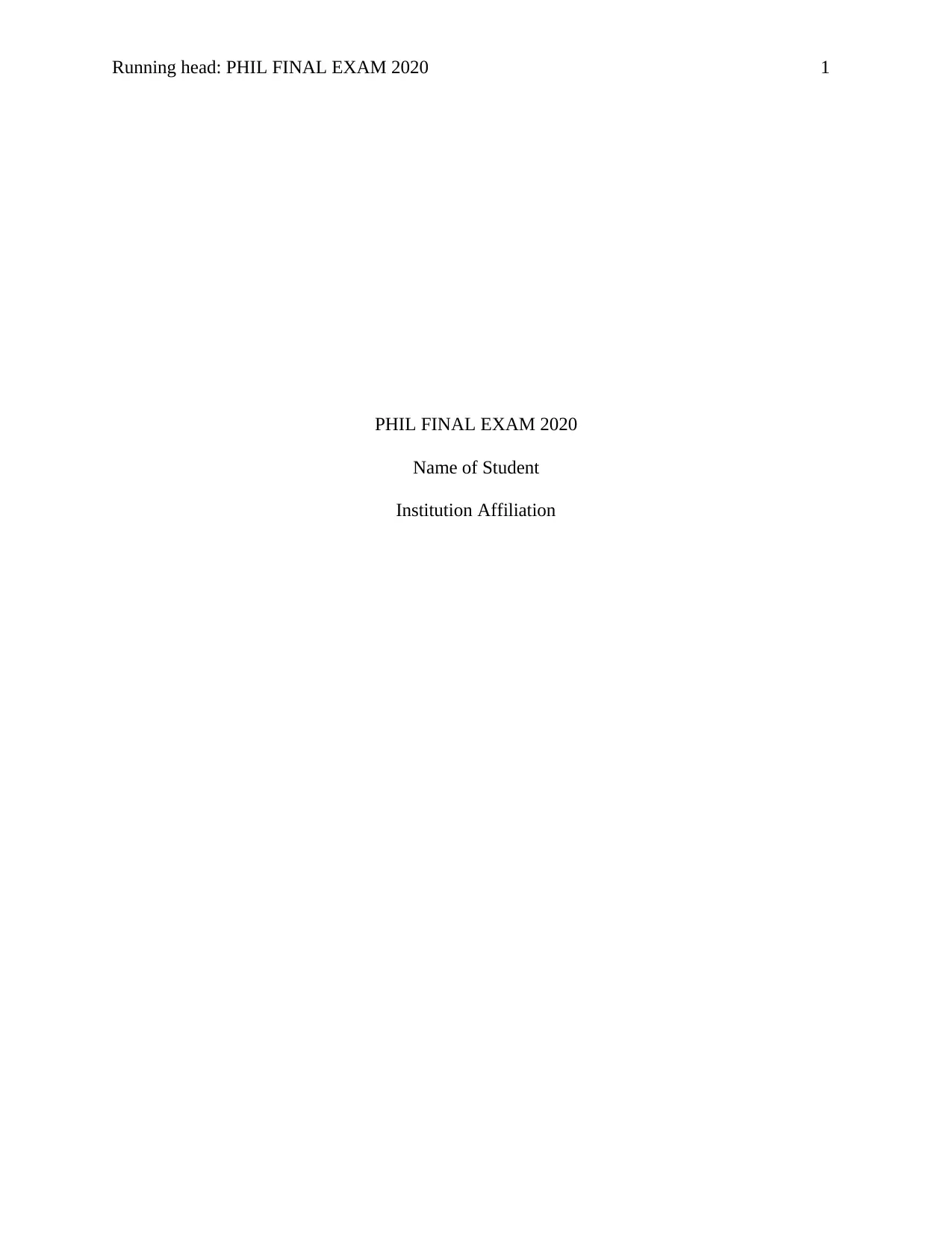
Running head: PHIL FINAL EXAM 2020 1
PHIL FINAL EXAM 2020
Name of Student
Institution Affiliation
PHIL FINAL EXAM 2020
Name of Student
Institution Affiliation
Paraphrase This Document
Need a fresh take? Get an instant paraphrase of this document with our AI Paraphraser
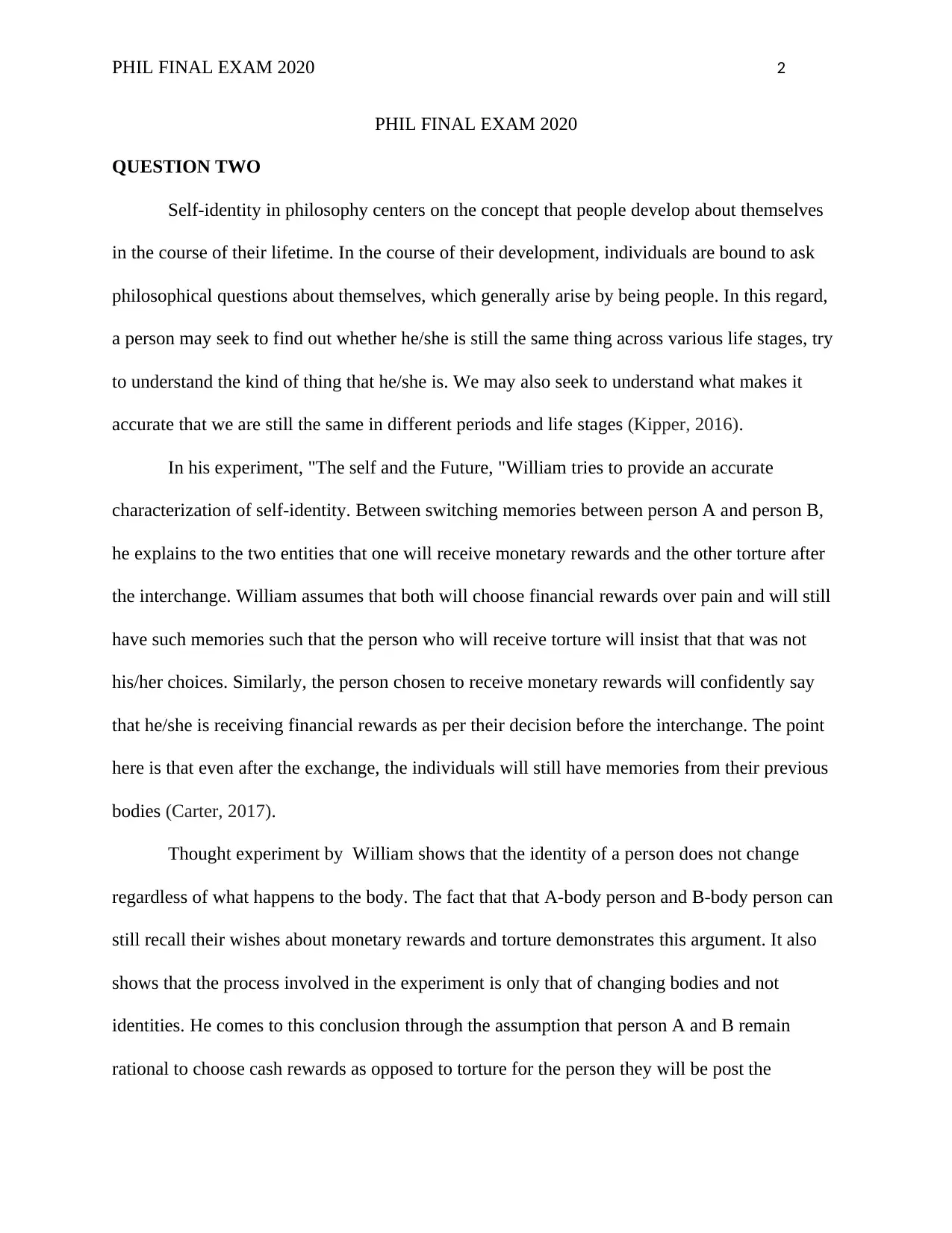
PHIL FINAL EXAM 2020 2
PHIL FINAL EXAM 2020
QUESTION TWO
Self-identity in philosophy centers on the concept that people develop about themselves
in the course of their lifetime. In the course of their development, individuals are bound to ask
philosophical questions about themselves, which generally arise by being people. In this regard,
a person may seek to find out whether he/she is still the same thing across various life stages, try
to understand the kind of thing that he/she is. We may also seek to understand what makes it
accurate that we are still the same in different periods and life stages (Kipper, 2016).
In his experiment, "The self and the Future, "William tries to provide an accurate
characterization of self-identity. Between switching memories between person A and person B,
he explains to the two entities that one will receive monetary rewards and the other torture after
the interchange. William assumes that both will choose financial rewards over pain and will still
have such memories such that the person who will receive torture will insist that that was not
his/her choices. Similarly, the person chosen to receive monetary rewards will confidently say
that he/she is receiving financial rewards as per their decision before the interchange. The point
here is that even after the exchange, the individuals will still have memories from their previous
bodies (Carter, 2017).
Thought experiment by William shows that the identity of a person does not change
regardless of what happens to the body. The fact that that A-body person and B-body person can
still recall their wishes about monetary rewards and torture demonstrates this argument. It also
shows that the process involved in the experiment is only that of changing bodies and not
identities. He comes to this conclusion through the assumption that person A and B remain
rational to choose cash rewards as opposed to torture for the person they will be post the
PHIL FINAL EXAM 2020
QUESTION TWO
Self-identity in philosophy centers on the concept that people develop about themselves
in the course of their lifetime. In the course of their development, individuals are bound to ask
philosophical questions about themselves, which generally arise by being people. In this regard,
a person may seek to find out whether he/she is still the same thing across various life stages, try
to understand the kind of thing that he/she is. We may also seek to understand what makes it
accurate that we are still the same in different periods and life stages (Kipper, 2016).
In his experiment, "The self and the Future, "William tries to provide an accurate
characterization of self-identity. Between switching memories between person A and person B,
he explains to the two entities that one will receive monetary rewards and the other torture after
the interchange. William assumes that both will choose financial rewards over pain and will still
have such memories such that the person who will receive torture will insist that that was not
his/her choices. Similarly, the person chosen to receive monetary rewards will confidently say
that he/she is receiving financial rewards as per their decision before the interchange. The point
here is that even after the exchange, the individuals will still have memories from their previous
bodies (Carter, 2017).
Thought experiment by William shows that the identity of a person does not change
regardless of what happens to the body. The fact that that A-body person and B-body person can
still recall their wishes about monetary rewards and torture demonstrates this argument. It also
shows that the process involved in the experiment is only that of changing bodies and not
identities. He comes to this conclusion through the assumption that person A and B remain
rational to choose cash rewards as opposed to torture for the person they will be post the
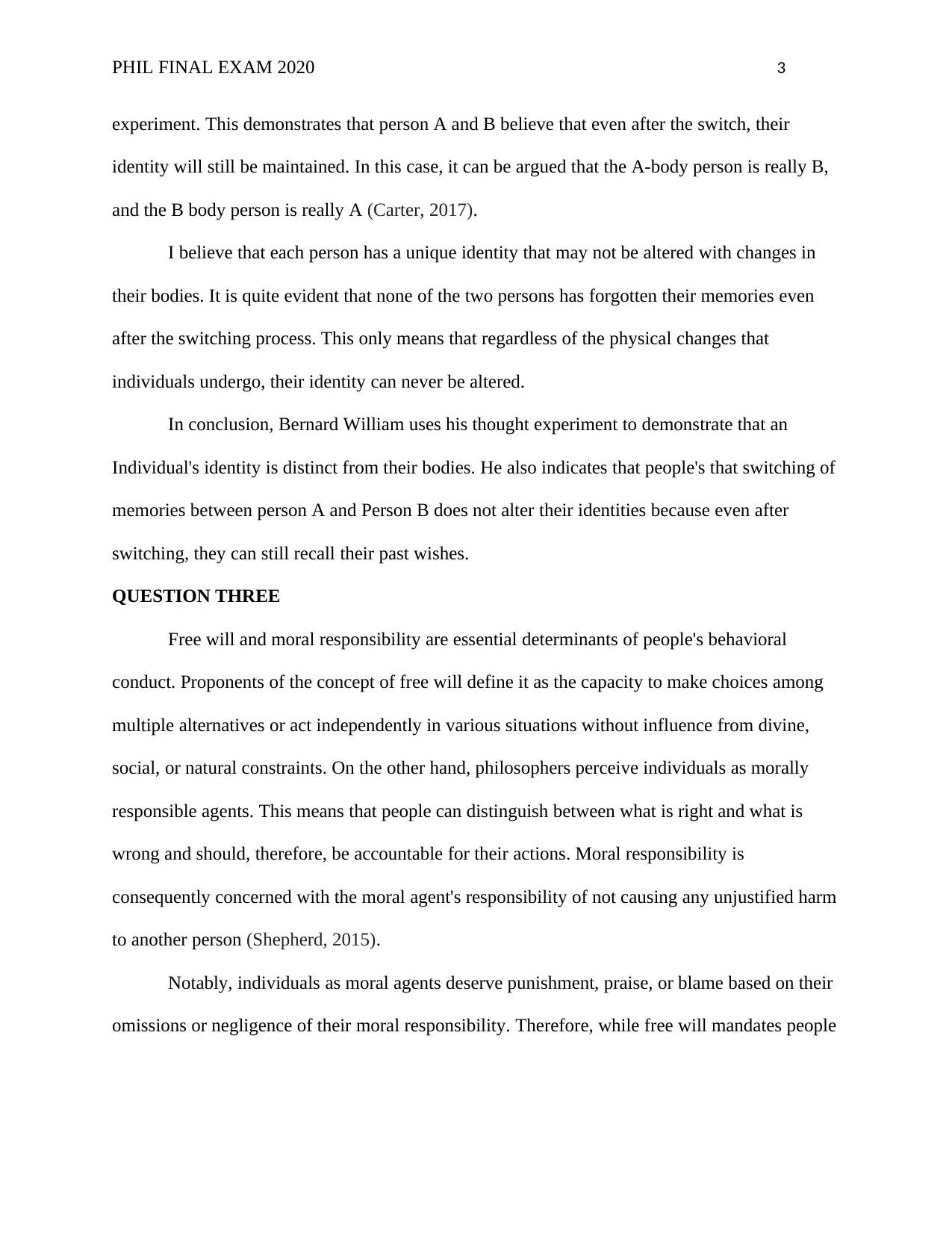
PHIL FINAL EXAM 2020 3
experiment. This demonstrates that person A and B believe that even after the switch, their
identity will still be maintained. In this case, it can be argued that the A-body person is really B,
and the B body person is really A (Carter, 2017).
I believe that each person has a unique identity that may not be altered with changes in
their bodies. It is quite evident that none of the two persons has forgotten their memories even
after the switching process. This only means that regardless of the physical changes that
individuals undergo, their identity can never be altered.
In conclusion, Bernard William uses his thought experiment to demonstrate that an
Individual's identity is distinct from their bodies. He also indicates that people's that switching of
memories between person A and Person B does not alter their identities because even after
switching, they can still recall their past wishes.
QUESTION THREE
Free will and moral responsibility are essential determinants of people's behavioral
conduct. Proponents of the concept of free will define it as the capacity to make choices among
multiple alternatives or act independently in various situations without influence from divine,
social, or natural constraints. On the other hand, philosophers perceive individuals as morally
responsible agents. This means that people can distinguish between what is right and what is
wrong and should, therefore, be accountable for their actions. Moral responsibility is
consequently concerned with the moral agent's responsibility of not causing any unjustified harm
to another person (Shepherd, 2015).
Notably, individuals as moral agents deserve punishment, praise, or blame based on their
omissions or negligence of their moral responsibility. Therefore, while free will mandates people
experiment. This demonstrates that person A and B believe that even after the switch, their
identity will still be maintained. In this case, it can be argued that the A-body person is really B,
and the B body person is really A (Carter, 2017).
I believe that each person has a unique identity that may not be altered with changes in
their bodies. It is quite evident that none of the two persons has forgotten their memories even
after the switching process. This only means that regardless of the physical changes that
individuals undergo, their identity can never be altered.
In conclusion, Bernard William uses his thought experiment to demonstrate that an
Individual's identity is distinct from their bodies. He also indicates that people's that switching of
memories between person A and Person B does not alter their identities because even after
switching, they can still recall their past wishes.
QUESTION THREE
Free will and moral responsibility are essential determinants of people's behavioral
conduct. Proponents of the concept of free will define it as the capacity to make choices among
multiple alternatives or act independently in various situations without influence from divine,
social, or natural constraints. On the other hand, philosophers perceive individuals as morally
responsible agents. This means that people can distinguish between what is right and what is
wrong and should, therefore, be accountable for their actions. Moral responsibility is
consequently concerned with the moral agent's responsibility of not causing any unjustified harm
to another person (Shepherd, 2015).
Notably, individuals as moral agents deserve punishment, praise, or blame based on their
omissions or negligence of their moral responsibility. Therefore, while free will mandates people
⊘ This is a preview!⊘
Do you want full access?
Subscribe today to unlock all pages.

Trusted by 1+ million students worldwide
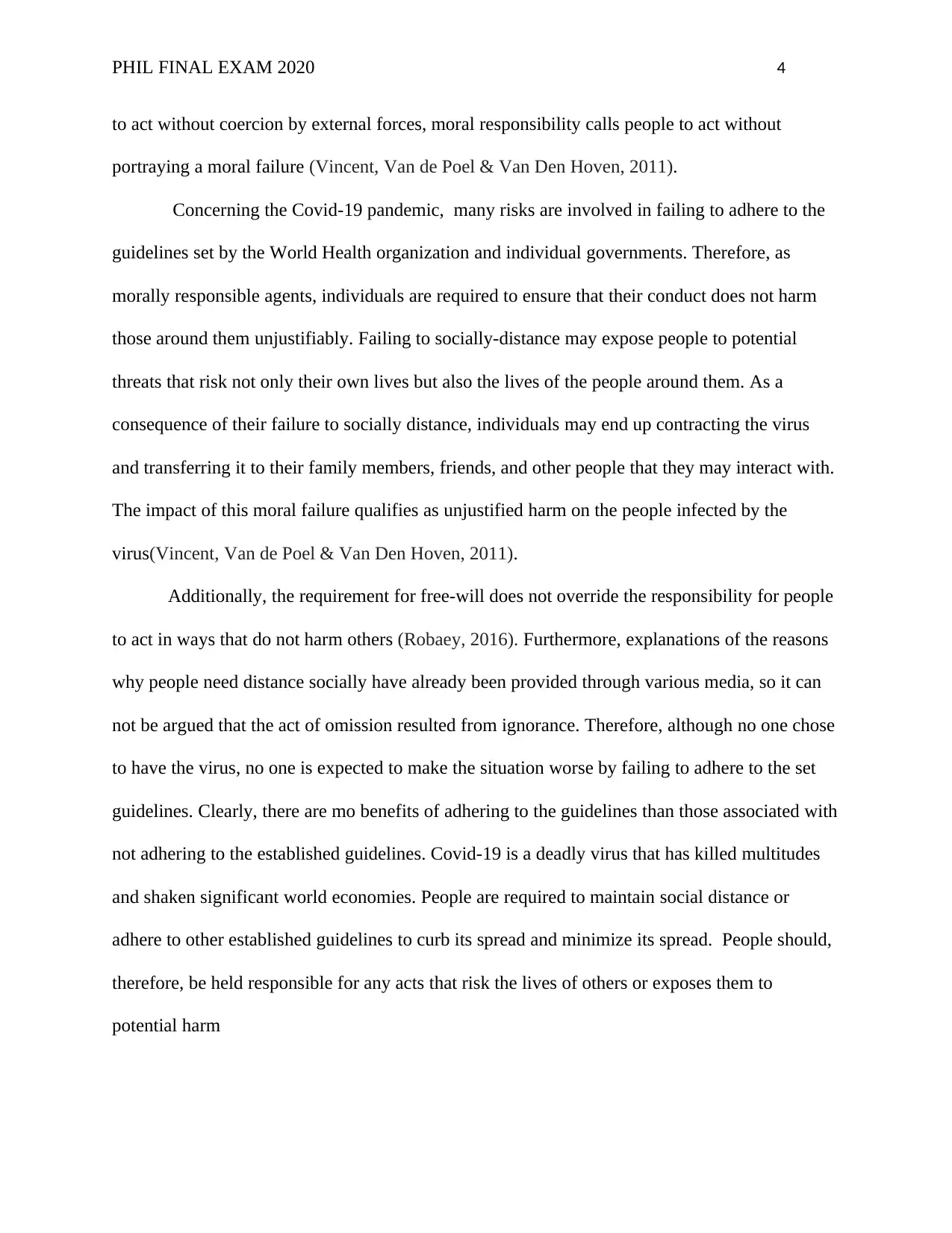
PHIL FINAL EXAM 2020 4
to act without coercion by external forces, moral responsibility calls people to act without
portraying a moral failure (Vincent, Van de Poel & Van Den Hoven, 2011).
Concerning the Covid-19 pandemic, many risks are involved in failing to adhere to the
guidelines set by the World Health organization and individual governments. Therefore, as
morally responsible agents, individuals are required to ensure that their conduct does not harm
those around them unjustifiably. Failing to socially-distance may expose people to potential
threats that risk not only their own lives but also the lives of the people around them. As a
consequence of their failure to socially distance, individuals may end up contracting the virus
and transferring it to their family members, friends, and other people that they may interact with.
The impact of this moral failure qualifies as unjustified harm on the people infected by the
virus(Vincent, Van de Poel & Van Den Hoven, 2011).
Additionally, the requirement for free-will does not override the responsibility for people
to act in ways that do not harm others (Robaey, 2016). Furthermore, explanations of the reasons
why people need distance socially have already been provided through various media, so it can
not be argued that the act of omission resulted from ignorance. Therefore, although no one chose
to have the virus, no one is expected to make the situation worse by failing to adhere to the set
guidelines. Clearly, there are mo benefits of adhering to the guidelines than those associated with
not adhering to the established guidelines. Covid-19 is a deadly virus that has killed multitudes
and shaken significant world economies. People are required to maintain social distance or
adhere to other established guidelines to curb its spread and minimize its spread. People should,
therefore, be held responsible for any acts that risk the lives of others or exposes them to
potential harm
to act without coercion by external forces, moral responsibility calls people to act without
portraying a moral failure (Vincent, Van de Poel & Van Den Hoven, 2011).
Concerning the Covid-19 pandemic, many risks are involved in failing to adhere to the
guidelines set by the World Health organization and individual governments. Therefore, as
morally responsible agents, individuals are required to ensure that their conduct does not harm
those around them unjustifiably. Failing to socially-distance may expose people to potential
threats that risk not only their own lives but also the lives of the people around them. As a
consequence of their failure to socially distance, individuals may end up contracting the virus
and transferring it to their family members, friends, and other people that they may interact with.
The impact of this moral failure qualifies as unjustified harm on the people infected by the
virus(Vincent, Van de Poel & Van Den Hoven, 2011).
Additionally, the requirement for free-will does not override the responsibility for people
to act in ways that do not harm others (Robaey, 2016). Furthermore, explanations of the reasons
why people need distance socially have already been provided through various media, so it can
not be argued that the act of omission resulted from ignorance. Therefore, although no one chose
to have the virus, no one is expected to make the situation worse by failing to adhere to the set
guidelines. Clearly, there are mo benefits of adhering to the guidelines than those associated with
not adhering to the established guidelines. Covid-19 is a deadly virus that has killed multitudes
and shaken significant world economies. People are required to maintain social distance or
adhere to other established guidelines to curb its spread and minimize its spread. People should,
therefore, be held responsible for any acts that risk the lives of others or exposes them to
potential harm
Paraphrase This Document
Need a fresh take? Get an instant paraphrase of this document with our AI Paraphraser
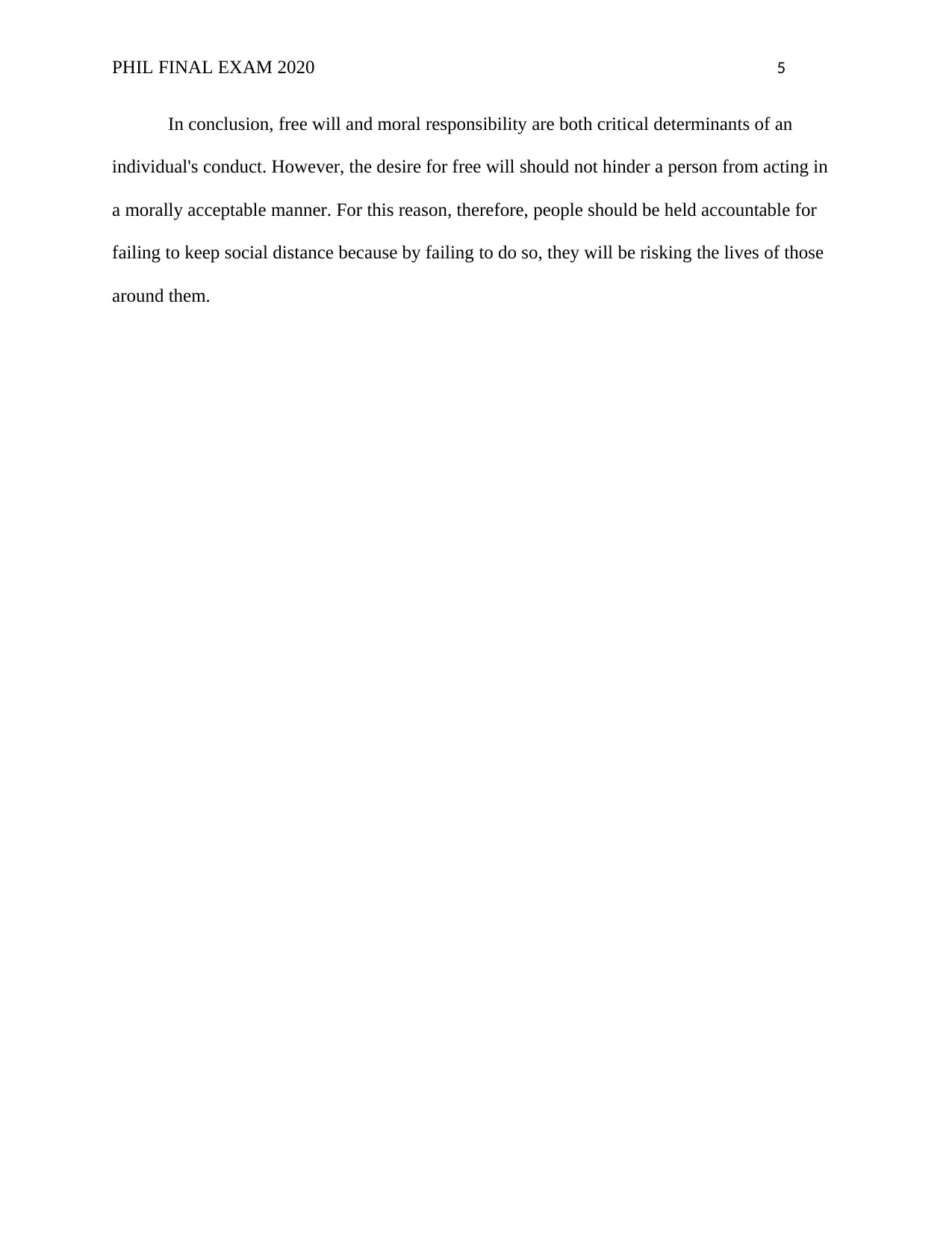
PHIL FINAL EXAM 2020 5
In conclusion, free will and moral responsibility are both critical determinants of an
individual's conduct. However, the desire for free will should not hinder a person from acting in
a morally acceptable manner. For this reason, therefore, people should be held accountable for
failing to keep social distance because by failing to do so, they will be risking the lives of those
around them.
In conclusion, free will and moral responsibility are both critical determinants of an
individual's conduct. However, the desire for free will should not hinder a person from acting in
a morally acceptable manner. For this reason, therefore, people should be held accountable for
failing to keep social distance because by failing to do so, they will be risking the lives of those
around them.
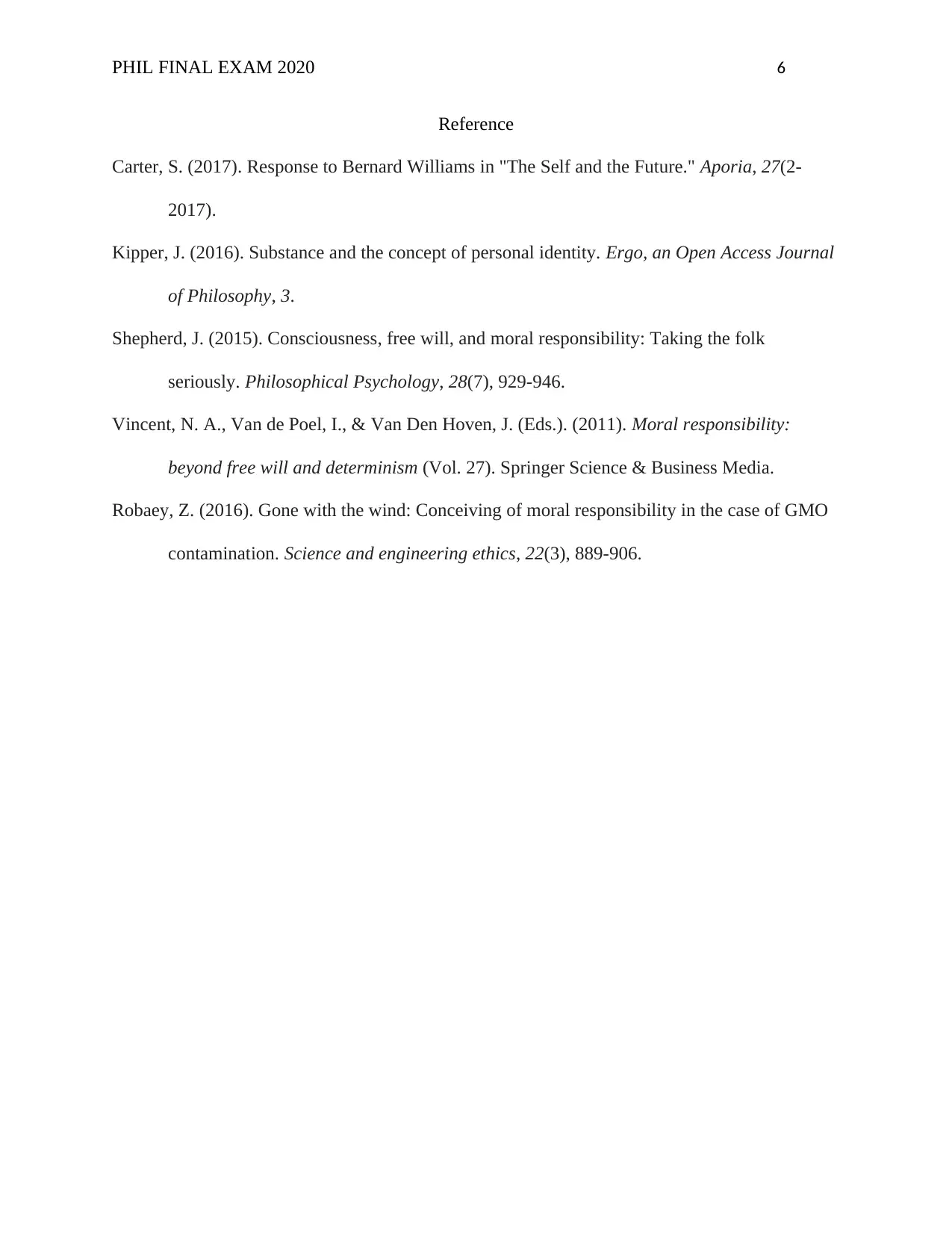
PHIL FINAL EXAM 2020 6
Reference
Carter, S. (2017). Response to Bernard Williams in "The Self and the Future." Aporia, 27(2-
2017).
Kipper, J. (2016). Substance and the concept of personal identity. Ergo, an Open Access Journal
of Philosophy, 3.
Shepherd, J. (2015). Consciousness, free will, and moral responsibility: Taking the folk
seriously. Philosophical Psychology, 28(7), 929-946.
Vincent, N. A., Van de Poel, I., & Van Den Hoven, J. (Eds.). (2011). Moral responsibility:
beyond free will and determinism (Vol. 27). Springer Science & Business Media.
Robaey, Z. (2016). Gone with the wind: Conceiving of moral responsibility in the case of GMO
contamination. Science and engineering ethics, 22(3), 889-906.
Reference
Carter, S. (2017). Response to Bernard Williams in "The Self and the Future." Aporia, 27(2-
2017).
Kipper, J. (2016). Substance and the concept of personal identity. Ergo, an Open Access Journal
of Philosophy, 3.
Shepherd, J. (2015). Consciousness, free will, and moral responsibility: Taking the folk
seriously. Philosophical Psychology, 28(7), 929-946.
Vincent, N. A., Van de Poel, I., & Van Den Hoven, J. (Eds.). (2011). Moral responsibility:
beyond free will and determinism (Vol. 27). Springer Science & Business Media.
Robaey, Z. (2016). Gone with the wind: Conceiving of moral responsibility in the case of GMO
contamination. Science and engineering ethics, 22(3), 889-906.
⊘ This is a preview!⊘
Do you want full access?
Subscribe today to unlock all pages.

Trusted by 1+ million students worldwide
1 out of 6
Your All-in-One AI-Powered Toolkit for Academic Success.
+13062052269
info@desklib.com
Available 24*7 on WhatsApp / Email
![[object Object]](/_next/static/media/star-bottom.7253800d.svg)
Unlock your academic potential
Copyright © 2020–2026 A2Z Services. All Rights Reserved. Developed and managed by ZUCOL.